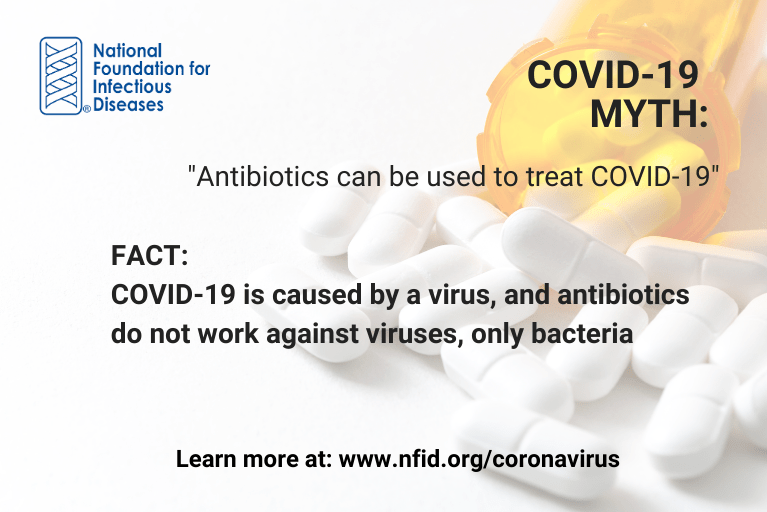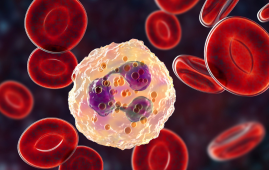

Each year in the US, more than 2.8 million antibiotic-resistant infections occur, and more than 35,000 people die as a result. Up to 50 percent of all antibiotics prescribed are not prescribed appropriately or are not needed at all. The National Foundation for Infectious Diseases (NFID) is joining the Centers for Disease Control and Prevention (CDC) as a partner to share 7 key facts that you should know about antibiotics:
1. Antibiotics can save lives. When used appropriately, antibiotics work remarkably well and fast. The benefits outweigh potential side effects or the risk of resistance.
2. Antibiotics are not always the answer. Some patients may appear to benefit from antibiotics, when, in fact, their persistent cough/cold would have gone away in about the same amount of time even without antibiotics.
3. Antibiotics do not work on viruses. Antibiotics are not effective against influenza (flu), coronaviruses, or other viruses that cause colds, bronchitis, or runny noses, even if the mucus is thick, yellow, or green.
4. Antibiotics only work against bacteria but not all bacterial infections need to be treated with antibiotics. Some bacterial infections, including many sinus infections and some ear infections, will resolve without antibiotics.
5. Antibiotics will not make you feel better if you have a virus. Respiratory viruses usually go away in a week or two without medication. Talk to a healthcare professional about things you can do to feel better, like drinking plenty of liquids, getting enough sleep, and staying home to rest.
6. If you do need antibiotics, take them exactly as prescribed. Talk to a healthcare professional if you have any questions or if you develop side effects, especially diarrhea since that could be caused by Clostridioides difficile (C. difficile), which needs to be treated.
7. Antibiotics are critical tools for treating life-threatening conditions, including sepsis and certain types of pneumonia. This makes it all the more important to use antibiotics appropriately.
The human body is full of bacteria, so when you take an antibiotic, the “good” bacteria in your gut may become more resistant to that antibiotic. Some people will not experience consequences from this, but others may develop subsequent resistant infections or pass resistant bugs on to family members. Antibiotic stewardship helps to keep people healthy, prevent drug-resistance, and ensure that life-saving antibiotics will work for future generations.
more recommended stories
 Rising Chagas Parasite Detected in Borderland Kissing Bugs
Rising Chagas Parasite Detected in Borderland Kissing BugsKey Takeaways (At a Glance) Infection.
 Can Ketogenic Diets Help PCOS? Meta-Analysis Insights
Can Ketogenic Diets Help PCOS? Meta-Analysis InsightsKey Takeaways (Quick Summary) A Clinical.
 Ancient HHV-6 Genomes Confirm Iron Age Viral Integration
Ancient HHV-6 Genomes Confirm Iron Age Viral IntegrationKey Takeaways for HCPs Scientists reconstructed.
 Fat-Regulating Enzyme Offers New Target for Obesity
Fat-Regulating Enzyme Offers New Target for ObesityKey Highlights (Quick Summary) Researchers identified.
 Gestational Diabetes Risk Identified by Blood Metabolites
Gestational Diabetes Risk Identified by Blood MetabolitesKey Takeaways (Quick Summary for Clinicians).
 Pelvic Floor Disorders: Treatable Yet Often Ignored
Pelvic Floor Disorders: Treatable Yet Often IgnoredKey Takeaways (Quick Summary) Pelvic floor.
 Circadian Control of Neutrophils in Myocardial Infarction
Circadian Control of Neutrophils in Myocardial InfarctionKey Takeaways for HCPs Neutrophil activity.
 E-Cigarette Use and Heart Attack Risk in Former Smokers
E-Cigarette Use and Heart Attack Risk in Former SmokersKey Takeaways for Clinicians and Nurses.
 Ultramarathon Physiology: What HCPs Should Know?
Ultramarathon Physiology: What HCPs Should Know?Ultramarathon Metabolism: What Happens to the.
 High-Intensity Training and Oxidative Stress Insights
High-Intensity Training and Oxidative Stress InsightsNew Evidence Linking High-Intensity Training and.

Leave a Comment